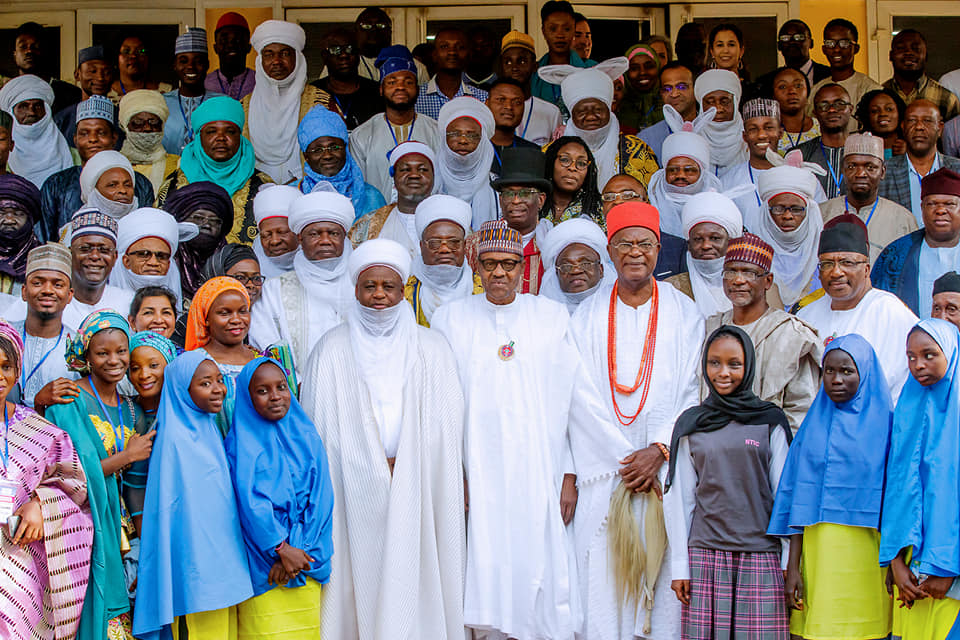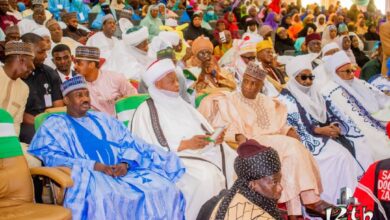Buhari, Sultan, Sarkin Kano, Obi Onitsha, Sarkin Keffi, discuss keeping African girls in school

The President, who described traditional leaders as “original guardians of history, security, traditions, customs and culture”, said they had not lost their dignity or esteem in spite of their change from “absolute monarchs to traditional leaders’’.
President of Nigeria, Muhammadu Buhari, on Monday urged Africa’s traditional and religious leaders to assist governments in addressing cyber-crime, human and drug trafficking, and disruptive social media challenges.
President Buhari spoke as traditional rulers and religious leaders, including the Sultan of Sokoto, Alhaji Muhammad Sa’ad Abubakar, the Emir of Kano, Alhaji Muhammad Sanusi II, Etsu Nupe Alhaji Yahaya Abubakar, Obi of Onitsha Igwe Achebe, Emir of Keffi Dr. Shehu Usman Chindo Yamusa III, among others, discussed ways of keeping African girls in school.
The leaders made the discussions during the Regional Conference for African Traditional and Religious Leaders on Keeping Girls in School in Africa, held at the Nicon Luxury Hotel in Abuja.
In his address, President Buhari, who is a prominent African leader, said the leaders should advise and assist their respective governments on strategies for combating the challenges which constituted barriers to the continent’s stability.
“I appeal to Your Majesties to bring your influence to bear and help your governments in combating the modern day challenges we face.
“Globalisation in the latter part of the 20th Century and in the 21st Century has brought in its wake, huge destructive problems such as insurgency, human and drug trafficking, cyber-crimes and disruptive social media.
“May I therefore remind Your Majesties of the important role to play.
“Your role is to advise and assist your governments in combating these challenges which present barriers to our continent’s stability and efforts to catch up with the rest of the world,” he said.
The President, who described traditional leaders as “original guardians of history, security, traditions, customs and culture”, said they had not lost their dignity or esteem in spite of their change from “absolute monarchs to traditional leaders’’.
On educating the girl-child, Buhari called on African governments to ensure that young African girls completed a minimum of 12 years of education with all its benefits for the continent.
He said, “At the very least, by the age of 14 our girls should be literate, numerate with computer skills and preliminary training to face life in the 21st century.
“I very much hope all African governments will support and implement this initiative.’’
The Sultan of Sokoto, Alhaji Muhammad Sa’ad Abubakar, at the event, highlighted the dangers of neglecting girl child education.
According to him, the Keeping Girls in School Conference is designed to address the human capital deficit.
“We have been told by experts consistently that development of Africa in every society starts with human capital development. The conference is conceived and designed to address this human capital development deficit,” the Sultan said.
The Emir of Kano, Alhaji Muhammadu Sanusi, in his address said funds are needed from the public and private sector to fund girl child education.
“We have been spending a lot of time blaming the victims. So while we talk about cultural practices, attitudes, we also talk about the need for these schools to be available for funding by the public and private sector.”
The Regional Conference for African Traditional and Religious Leaders on Keeping Girls in School in Africa is a three-day conference aimed at triggering a kind of renaissance in Africa, by launching the drive for girls child education in Africa.
It is also aimed at ensuring that African girls and future mothers are educated so that they produce and bring up healthy and educated children who will lead Africa to greatness in the 21st century.
In a keynote address, United Nation’s Deputy Secretary-General, Amina Mohammed, represented by UN Deputy Special Representative for West Africa and the Sahel Region, Ruby Sandy-Rojon, emphasized the critical essence of educating the girl-child to the African economy.









